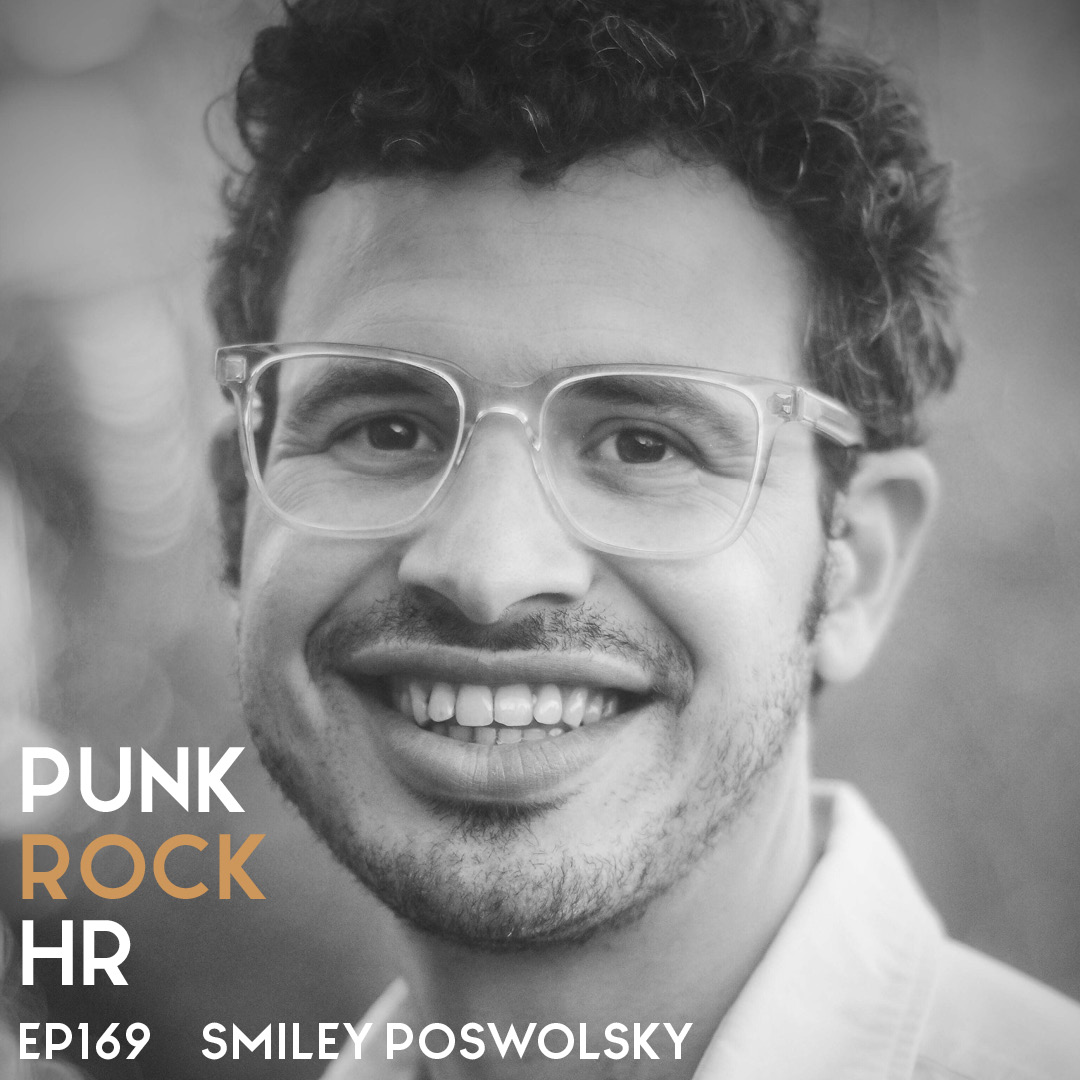
Do you wonder why it feels like we’re more connected than ever before, yet it feels so difficult to fight off feelings of loneliness and keep true friendships alive?
In this episode of Punk Rock HR, I talk to Smiley Poswolsky about the reasons why we can feel so alone despite being connected with others online 24/7. Smiley is a workplace expert, speaker and author of the terrific new book “Friendship in the Age of Loneliness: An Optimist’s Guide to Connection.” The book discusses ideas of technology addiction, showing up as our true selves and what we can do to be vulnerable and form authentic connections.
“The average American hasn’t made a new friend in the last five years. 75% of folks are not satisfied with their friendships. Many people have zero friends at work, even though there’s data showing that if you have even one friend at work, you’re more engaged,” Smiley says. Listen to our conversation about making new friends, overcoming loneliness and living a meaningful life.
This episode of Punk Rock HR is sponsored by the Shift Career Summit on June 17. Mary Ellen Slayter of Managing Editor and I are bringing together some of the biggest names in the world of work to help you take control of your career. The event is completely free, and you can register today at ShiftDigitalCareers.com.
“How Do You Feel?”
That question is everywhere these days. We hear it all the time, whether it’s our company’s routine well-being check-ins or brands looking to form deeper connections with customers. Has loneliness increased, or are we just asked this question more often now, leading us to more frequent moments of reflection about what’s lacking in our social lives?
Smiley answers this by first explaining the difference between intentional social isolation and loneliness. “Loneliness is a subjective gap between the perception of one’s actual level of connection and desired level of connection,” he says. And yes, we are prompted more often nowadays to perceive this gap and ruminate on feelings of loneliness. “Many people are spending eight to 12 hours a day on a screen, scrolling through everyone else’s lives,” Smiley explains. “It’s impossible not to say, ‘Wait, why wasn’t I invited to that event?’ or ‘How come I wasn’t invited to that dinner?’ We see the gap more. It’s more in our face.”
Destigmatizing Mental Health
There’s often a strong connection between loneliness and issues of mental health such as anxiety and depression. It can be difficult for someone who is suffering to find the willpower to get out there and try to form more meaningful connections with others. “How can we show up for other people in our lives if we’re not showing up for ourselves?” Smiley asks. He discusses the benefits of therapy, the need for mental health services to be accessible and the value of normalizing the conversation around mental health.
It can also help to destigmatize the idea of loneliness itself. “There’s a stigma around loneliness that it’s a bad thing,” Smiley says. “But what if we flip that and kind of say, ‘You know what, I’m scheduling alone time.’” People tend to feel guilty about choosing to be of service to themselves and instead believe that they always need to be available and connected. But one key to improving mental health in the age of loneliness is to change the way we think and talk about the value of simply unplugging and restoring.
How to Fix Loneliness
Even the most successful people have moments of doubt and can feel like an imposter. Smiley shares some solutions from his book around addressing loneliness and feeling a greater connection to others.
- Understand that you’re not alone. Even when we feel isolated, there are opportunities for engagement with others. Smiley’s work as a speaker who brings people together in a fun and positive way has shown him that there’s always potential for meaningful connections.
- Know that it takes time. In order to really get to know someone, you need to put in the time and effort. “We want the quick fix and we want something to happen right away,” Smiley says. But it doesn’t work that way. Every friendship starts somewhere, and you can “start small by going to an event or inviting people over. Those simple acts of putting connection more at the center of your life.”
- Try new things and be curious. Stepping out of your comfort zone and doing novel activities is particularly important if you’ve just moved somewhere new or are starting a new job, for instance. Being curious about the people you meet means asking good questions in order to get to know them on a deeper level. Smiley recommends going beyond the typical “What do you do for a living?” questions that fall flat and instead ask things that make people feel excited: “What’s the last book you read?” or “Do you have a creative project?” or “What are your current aspirations?”.
- Take advantage of the mere-exposure effect. The longer we spend around people, the more we tend to like them. That’s why ongoing activities can do a great job at combating loneliness. “Often we think of a connection as going to a one-off event: going to a bar or a party. But it’s so much more effective if you can join something that’s an ongoing activity, like a book club that meets once a month,” says Smiley.
[bctt tweet=”‘If you’re really looking for friendship in the age of loneliness, spend more time with a few people in your life. Let a few people in your life know that you really care about them and that you love them.’ ~ Smiley Poswolsky. Hear more on Punk Rock HR!” via=”no”]

You must be logged in to post a comment.